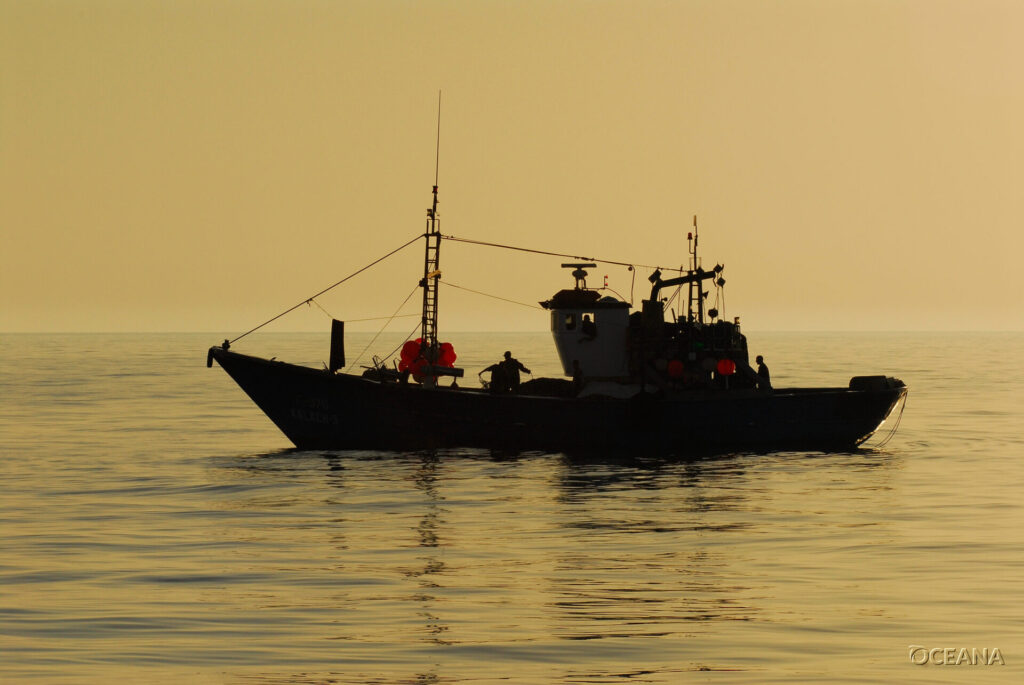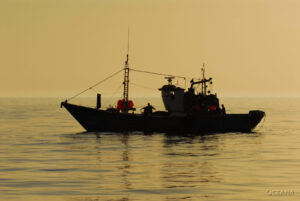
Oceana at the World Ocean Council’s Sustainable Ocean Summit
https://pulltheplugonpiratefishing.org/wp-content/uploads/2022/10/pponpirates-FINAL-DRAFT.mp4 Oceana will be attending

Industry leaders are increasingly recognizing the importance of tackling illegal, unreported and unregulated (IUU) fishing and many now integrate anti-IUU fishing counter strategies into their business practice. While strides have been made, work remains to be done. Crosscutting solutions and collaboration amongst the private sector is paramount and is the next step towards preventing illegal fishing and safeguarding the health of the ocean.
To evaluate what tools can be used towards this initiative, we have asked Thomas Bishop, Underwriter – Hull & War at QBE Insurance and Arielle Sutherland-Sherriff, Policy Assistant at Oceana in Europe.
Question 1: What is the role of companies in fighting against IUU fishing?
Proposed solution from Oceana:
Illegal fishing is notoriously difficult to tackle and assistance from the private sector has the potential to deter malpractice present in the fishing industry. Much like legitimate fishing operators, illegal operators need assistance from businesses for vessel repairs and maintenance, fuel provision, logistical support, satellite communication, classification, as well as for hiring crew members. By limiting their services to legitimate operators, businesses can make it more difficult for illegal operators to maintain financial viability and continue fishing.
Oceana, as well as the European Union and the United Nations, are pushing for the private sector to be part of the solution. In many countries, companies may be at risk of non-compliance with national and/or international legislation if they conduct business with IUU fishing operators.
Proposed solution from QBE Insurance:
We believe it is the responsibility of any member of the fishing sector to do their utmost to disrupt the ability for IUU fishing to occur. Therefore, at QBE we see ourselves as a key barrier for any illegal operators due to our capacity to restrict access to the provision of insurance, which is a vital enabler to trade.
Question 2: How can companies change their procedures to become more effective at countering IUU fishing?
Proposed solution from Oceana:
Illegal fishers capitalise on the vastness of the ocean and on the opaqueness of the fishing sector, which make it difficult for authorities to track them down. Against this backdrop, many businesses who provide services to the global fishing fleet, particularly marine insurers, have begun to counter IUU fishing by restricting access to their services, which is an essential step to stop this practice that destroys marine ecosystems.
To fight fraudulent behaviour more effectively, companies would greatly gain in sharing information with each other, particularly if they have denied services to an officially IUU-listed vessel that may have approached them.
To avoid the risk of providing essential services to an IUU-listed vessel, companies need to push for greater transparency and accountability within the global fishing industry by, for example, encouraging the use of vessel tracking devices and unique vessel identification (IMO) numbers.
For further information, you can read our new guidance developed for businesses on how they can identify and avoid business contracts with IUU fishing vessels, which can be accessed here.
Proposed solution from QBE Insurance:
Companies, and in our case marine insurers, can change and improve their procedures in respect of countering IUU fishing by embedding checks throughout the lifetime of a fishing operator’s policy. At QBE, by utilising Trygg Mat Tracking’s database to screen each vessel, we have been empowered to thwart these operators prior to insuring a vessel, whilst also monitoring all vessels during the time they are on risk.
Question 3: Collaborating and sharing information is important, but how can businesses do so as part of the fight against IUU fishing?
Proposed solution from Oceana:
Lists of vessels known to have engaged in IUU fishing are maintained by the European Union, and by twelve Regional Fisheries Management Organisations with mandates to manage internationally shared fish stocks or areas. When a company refuses to offer services to an IUU-listed vessel, other companies may be at risk of entering into contract with the same vessel, making information sharing a valuable instrument. The name disclosure of an IUU-listed vessel seeking a given service is therefore critical information for businesses operating in the maritime sector.
Oceana developed an online data sharing tool which enables companies to confidentially exchange IUU fishing vessel information with each other. Oceana’s information-sharing tool was designed for companies who offer services to the global fishing fleet, and permits the exchange of information on IUU fishing vessels. This platform is free to use and available for all businesses providing services to fishing vessels.
In addition, companies are encouraged to directly reach out to national fisheries control authorities and relevant non-profit organisations, such as Oceana, when they are approached by an IUU-listed vessel.
Proposed solution from QBE Insurance:
Having reliable data is crucial to preventing the provision of insurance to vessels engaged in IUU fishing. Collaboration and sharing of data regarding IUU fishing vessel information between companies not only increases the validity of information on illegal operators, but allows a joined-up and consistent approach from insurers to counteract these practices.
Question 4: How does Oceana’s new tool help businesses improve their ability to counter IUU fishing through information-exchange?
Proposed solution from Oceana:
Oceana’s new tool enables companies to improve their ability to fight IUU fishing activities at sea through knowledge and information-sharing, encouraging them to deny services that IUU fishing vessels need in order to be operational. Through this tool, marine professionals are combating IUU fishing and increasing transparency by notifying each other when a vessel on the official IUU fishing vessel list of any regional fisheries management organisation (RFMO) has sought and been denied services, or had services cancelled. In addition, when new vessels are added to the IUU fishing vessel list of any RFMO, alerts are sent to registered companies.
The fight against illegal fishing needs to happen on all fronts and companies offering services to fishing fleets have an active role to play in this endeavour. They have the power to close the net on these vessels by preventing them from obtaining essential services and making their operation at sea practically and financially unviable. This bottom up approach to tackling fraud in the fishing sector is key and will require the collaboration of all large businesses involved in the maritime sector.

https://pulltheplugonpiratefishing.org/wp-content/uploads/2022/10/pponpirates-FINAL-DRAFT.mp4 Oceana will be attending

Industry leaders are increasingly recognizing
| Cookie | Duration | Description |
|---|---|---|
| cookielawinfo-checkbox-analytics | 11 months | This cookie is set by GDPR Cookie Consent plugin. The cookie is used to store the user consent for the cookies in the category "Analytics". |
| cookielawinfo-checkbox-functional | 11 months | The cookie is set by GDPR cookie consent to record the user consent for the cookies in the category "Functional". |
| cookielawinfo-checkbox-necessary | 11 months | This cookie is set by GDPR Cookie Consent plugin. The cookies is used to store the user consent for the cookies in the category "Necessary". |
| cookielawinfo-checkbox-others | 11 months | This cookie is set by GDPR Cookie Consent plugin. The cookie is used to store the user consent for the cookies in the category "Other. |
| cookielawinfo-checkbox-performance | 11 months | This cookie is set by GDPR Cookie Consent plugin. The cookie is used to store the user consent for the cookies in the category "Performance". |
| viewed_cookie_policy | 11 months | The cookie is set by the GDPR Cookie Consent plugin and is used to store whether or not user has consented to the use of cookies. It does not store any personal data. |
Once validated, your submission will be posted and the alert will be sent to all users of the tool.
Thank you for submitting your details to register for the IUU Fishing Vessel Information Sharing Portal.
Your details are currently being reviewed by one of our team members.
You will receive a notice once your registration has been successfully processed.
If you are a professional working for a company that provides supporting services to fishing vessels, refrigerated transport vessels, and supply ships, and do not belong to to a commercial team with direct decision-making capacity on prices or other related commercial decisions, you are invited to register to use the tool, filling out details on the provided form below.